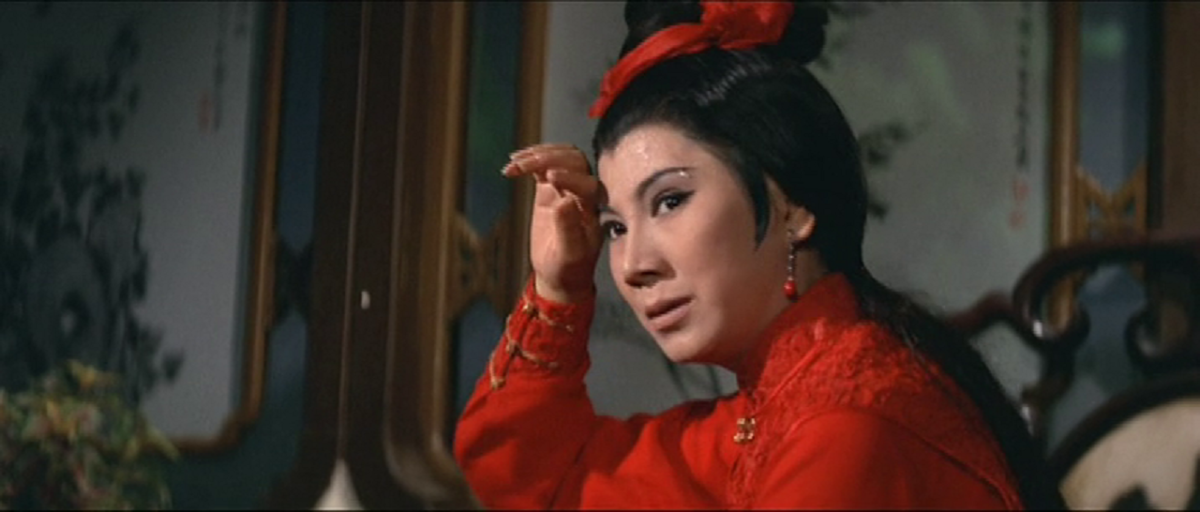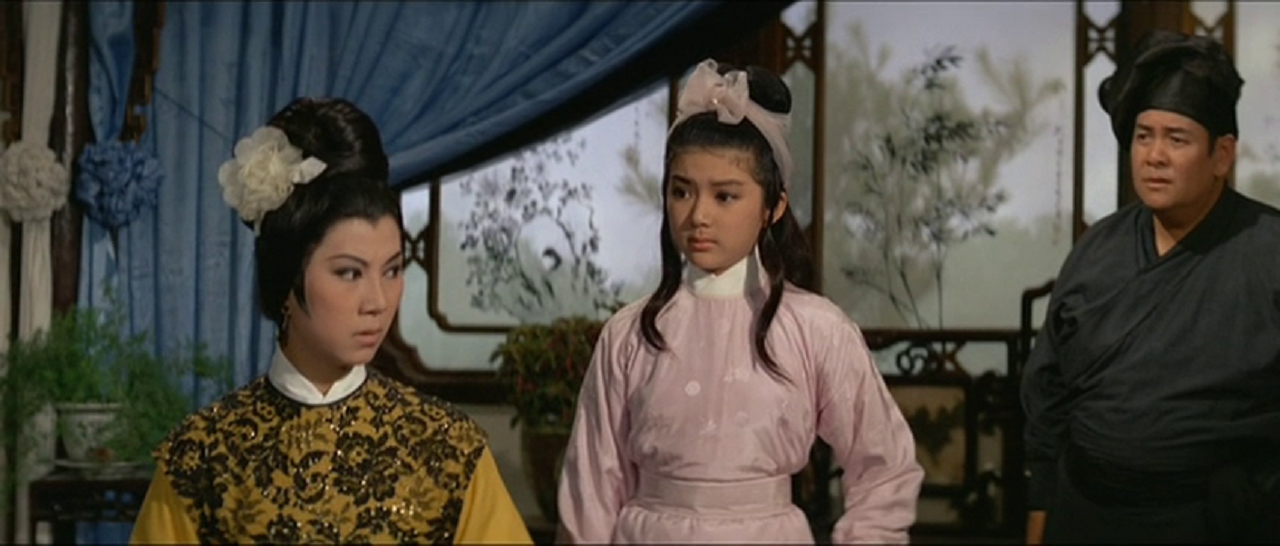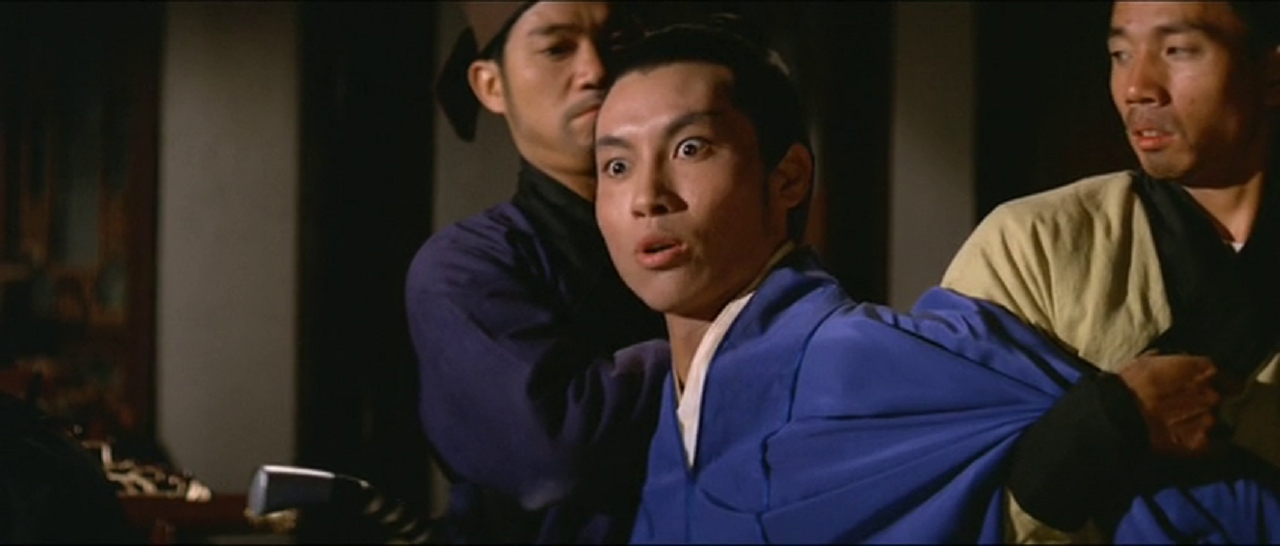Last Updated on October 2, 2020 by rob
Kuei Wu (Jimmy Wang-yu) and Lien Chu (Chin Ping) are escorting the deadly dart-spitting Phoenix Lute when it’s stolen by the Flying Tiger Clan whose leader, Wei Feihu (Miao Ching), frantically seeks a cure after his own son is poisoned by the Lute’s darts during battle. But Feihu’s attempt to trick the innocent Shen Shuwen (Yueh Hua) into leading him to the cure – a jewel with magical powers known as the Seven Stars Stone – is frustrated by the arrival of a child named Hsiao-Ling (BoBo Fung), her faithful servant Daixin (Peng Peng) and the mysterious Tu Ying (Lieh Lo), a stranger with a secret agenda of his own.
The third in a trilogy comprising Temple Of The Red Lotus and The Twin Swords and for me the best of the bunch. The idea of an all powerful weapon which falls into the wrong hands is a good one (there’s even a thematic point made here about how you can go too far with killing) and the Lute itself – a musical instrument that can also fire wave after wave of lethal needle darts – is an original enough creation to hold our attention. Entrusted for destruction to Kuei Wu and Lien Chu by Ivy Ling-po’s Scarlet Maid intriguingly implies this was never a weapon intended for use by mere mortals.
That both heroic Shen Shuwen and villain Wei Feihu’s son are casualties of the weapon lends the story an urgent emotional undercurrent but unlike the first two films doesn’t allow these developments to bog the pace down with overwrought melodramatics. In part this is because the young lovers Kuei Nu and Lien Chu drop out of the story once Shen Shuwen comes on the scene and don’t really crop up again until the climax. The bulk of the story concerns Shen Shuwen’s journey to the Quin mansion, aided by BoBo Fung’s child Hsiao-Ling, her faithful servant Daixin and a mysterious stranger Tu Ying (Lieh Lo) who tags along after selling Hsia-Ling his horse. This mid-section is by far the best part of the film.
All four characters prove highly engaging and freed from the presence of Kuei Nu and Lien Chu, who even after two movies were never a terribly interesting couple, director Jang-Hung has lots of fun with repeated attempts by the Flying Tigers to steal little Hsio-Ling’s indestructible sword as the travellers stop off at various inns. At the same time he gets to play up the mystery of Tu Ying whose own agenda links to something we saw happen in the second film of the series. Of the large cast the standouts here are BoBo Fung, Peng Peng and Lieh Lo. BoBo was only about 12 when this was made but she gives a confident and enjoyable performance and she has nice chemistry with Peng Peng’s loyal servant.
Lieh Lo of course has charisma to burn as the scruffy, devious, but ultimately decent Tu Ying. So much so in fact that one doesn’t really mind the extremely contrived reason for his appearance, we’re just glad to see him back. Unfortunately the director does struggle a bit with some of the supporting cast. As villains, the likes of Lily Ho, Lee Wang Chung and a returning Yuen Siu-tien (as the leader of the Red Lotus Clan) never get enough room to develop their roles so the big showdown in which they meet their end has a somewhat perfunctory feel to it as if the sheer number of characters needing to be dealt with overwhelmed the director. The fights here, if anything, look slightly less polished than what we saw in the first two movies.
There’s lots of ducking, jumping, thrusting and parrying with swords but the wild physical skills that would come to define the genre (leaping up onto balconies etc) are conspicuous by their absence and you can sometimes see the performers freeze in their movements as they wait for their opponent to catch up with them! And yet the advantage is that these fights are at least grounded in what feel like high emotional stakes. An assault on the Quin mansion in which the Scarlet Maid operates on a dying Shen Shuwen with the Seven Stars Stone as a massive fight rages right around her is a clever and involving bit of staging. As in the first two movies Ivy Ling Po’s Scarlet Maid turns up at the end like some fairy Godmother to set matters right and deliver a cautionary warning to Hsiao-Ling about the perils of bloodlust. It’s a satisfactory conclusion to the trilogy with its strengths comfortably outweighing its weaknesses so making it – for me – the best of the three.



